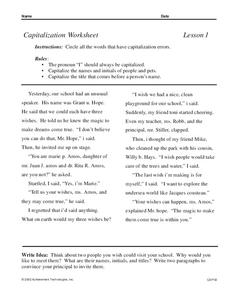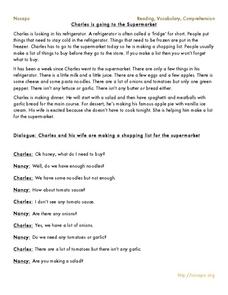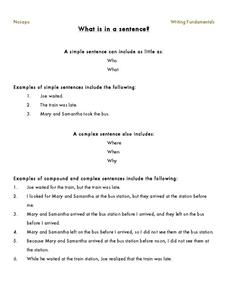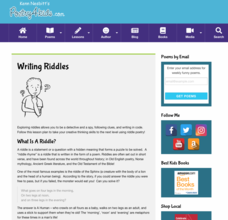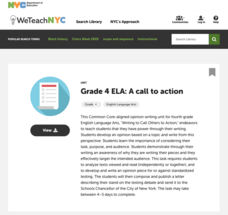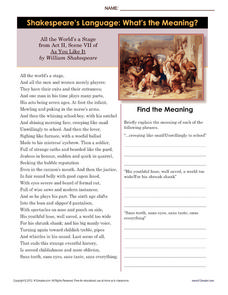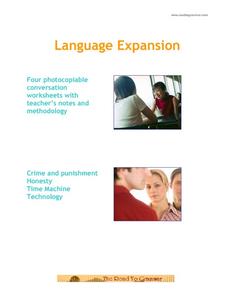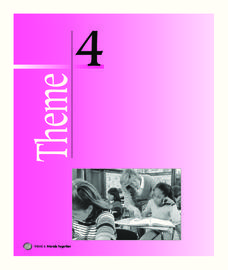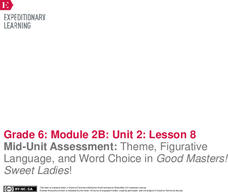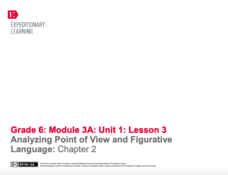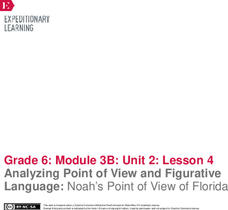Curated OER
Understanding Protagonists and Antagonists
How can you tell if a character is a villain? What about a hero? Work on literary analysis with an engaging language arts worksheet. After completing an activity about the four types of conflict, learners fill out a character map about a...
Lakeshorelearning
Read and Write about It
Reading informational text is a skill that transcends subjects and grade levels. Practice reading about different topics in various formats with a language arts lesson that includes opportunities for writing and research as well.
Achievement Technologies
Language Arts Worksheets
Looking for some quick grammar warm-ups? What about handy spelling crossword puzzles? Find everything you need with a resource that contains practice worksheets for parts of speech, parts of a sentence, common grammatical errors, tricky...
Curated OER
Object Pronouns
Work on replacing the object of a sentence with object pronouns. A handy grammar worksheet prompts language arts learners to read 20 sentences and choose the correct pronoun to fill in the blank from the word box above.
Read Works
The Age of Exploration
Christopher Columbus did not have a lot of evidence to prove that he was in India, but language arts pupils have plenty of evidence to prove that he wasn't. Delve into the world of European exploration with a reading activity about...
Turabian Teacher Collaborative
Parts of Argument III: The Claim Game
Throw down with a fun language arts game! Armed with a hand of writing-themed cards, learners craft arguments based on the strategies written on the cards, dropping cards as they discuss their claims further until there are no strategies...
Curriculum Corner
Valentine Math and Literacy Practice
Looking for math and literacy practice with a Valentine's Day theme? Look no more, because this 43-page packet is filled with practice pages intended to reinforce basic math, reading, and writing skills. From counting to writing words to...
Nosapo
Reading, Vocabulary, Comprehension
Whether you teach mainstream elementary classes or older English learners, a set of reading comprehension resources is a great addition to your language arts curriculum. Ten activities each include a reading passage and set of...
Nosapo
What Is in a Sentence, Paragraph, and Story?
Language arts is made up of many parts. Learners review the parts of a sentence, as well as how to make a simple sentence into a complex sentence, before examining full paragraphs and identifying the topic, body, and concluding sentence...
Poetry4kids
How to Write a Limerick
Add a little fun and fancy to English language arts with an activity that challenges scholars to write a limerick. Authors follow five rules in order to compose an original poem that contains a specific rhyme scheme.
Poetry4kids
Writing Riddles
What's got 60 eyes, 150 fingers, and an endless number of ideas? Your language arts class! Challenge young writers to come up with clever riddles with an online poetry lesson.
New York City Department of Education
Grade 4 Literacy in English Language Arts: A Call to Action
You have the power! Scholars learn that they have power of the pen in their writing. After reading and viewing various sources about standardized testing, they express their own opinions about the testing by writing letters to the...
New York City Department of Education
Grade 5 Literacy in English Language Arts: Should the School Day Be Longer?
Scholars read newspaper articles relating to a longer school day and complete note-taking organizers as they read. They then form opinions and complete outlines before writing essays supporting their point of view.
K12 Reader
Shakespeare's Language: What's the Meaning?
You needn't be an actor to stage this exercise in reading comprehension. Kids examine Jacques's "All the World's a Stage" speech from Act II, scene ii, of As You Like It, and explain the literal meaning of the figurative language. There...
K12 Reader
Adding Alliteration to Poetry
Alliteration can make the language of a poem flow. Add adjectives to several blanks in two poems to form alliterative phrases.
Houghton Mifflin Harcourt
Person to Person: English Language Development Lessons (Theme 4)
Help language learners understand words and cultural concepts. The second installment in a series of three language development lessons designed to accompany Theme 4: Person to Person helps bridge the gap for language learners by...
National Constitution Center
AP English Language—Precision of Language
Say what you mean and mean what you say. The Precision of Language addresses the importance of words, especially when they concern a person's rights. Scholars take a look at many different examples and complete questions analyzing the...
J. Paul Getty Trust
Looking and Learning in the Art Museum — Lesson 1
To prepare for a field trip to a local art museum, art class members journal their initial reactions to a reproduction of the work they will focus on during their visit. The whole class then considers the artistic elements in the piece...
Road to Grammar
Language Expansion
Improve your pupils' language skills with these discussions and activities. There are four topics included here, and each is paired with discussion prompts (small group and whole class), student handouts, and teacher notes. After...
Houghton Mifflin Harcourt
Friends Together: English Language Development Lessons (Theme 4)
Enjoy this thematic friendship unit compiled with ESL lessons to develop strong language development while listening, speaking, looking, and moving. Class members participate in activities covering topics like making friends, asking for...
EngageNY
Mid-Unit Assessment: Theme, Figurative Language, and Word Choice in Good Masters! Sweet Ladies!
Time to show what you know. Scholars complete a mid-unit assessment to demonstrate their learning from the past lessons. Learners work independently to identify the theme and answer questions about Pask, the Runaway. They also examine...
EngageNY
Analyzing Point of View and Figurative Language: Chapter 2
Just get to the gist. Scholars work in pairs to find the gist of an excerpt from Laurence Yep's Dragonwings. Pupils also complete graphic organizers to analyze the text for tone, point of view, and figurative language.
EngageNY
Analyzing Point of View and Figurative Language: Chapter 3
Get to the point ... the point of view, that is! Pupils analyze Laurence Yep's Dragonwings for tone, figurative language, and point of view by completing graphic organizers. Scholars also read an excerpt from the novel and record the...
EngageNY
Analyzing Point of View and Figurative Language: Noah’s Point of View of Florida
Fishing for words. Scholars search for unfamiliar words in pages 27-29 of Flush, place them in their word catchers, and complete part of Noah’s Point of View graphic organizer. After identifying figurative language, learners analyze tone...
Other popular searches
- 5th Grade Language Arts
- 3rd Grade Language Arts
- 4th Grade Language Arts
- Second Grade Language Arts
- English Language Arts
- 1st Grade Language Arts
- Kindergarten Language Arts
- Language Arts Jeopardy Game
- First Grade Language Arts
- Language Arts School Projects
- Language Arts Lesson Plans
- Language Arts Games




